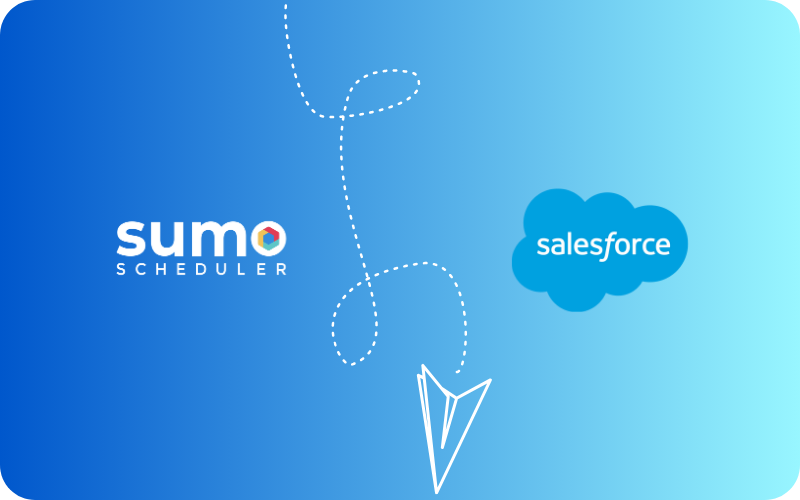Managers in event agencies have to deal with a ton of information every day: responding to dozens of clients, preparing commercial proposals, discussing programs with hosts, and drawing up contracts. Keeping everything in Excel turns into a mess—information gets forgotten or lost. That’s where event management apps come in handy.
Are you looking to manage events in Salesforce? We’ve created a roundup of the best Salesforce event management software to help you organize and keep track of all your essential event data right in your CRM.
Key Takeaways
- Event management apps help remove the stress of event preparation and execution by automating registrations, booking, contact outreach, venue management, and ticketing tasks while syncing all data within Salesforce.
- SUMO Scheduler stands out as the best Salesforce native event scheduling app. Along with event & appointment booking, it provides powerful customer engagement capabilities for healthcare, higher education, government, and nonprofit sectors. Sales and marketing teams can launch branded event registration pages in no time, thanks to its no-code, user-friendly interface. Seamless Salesforce synchronization and detailed analytics automate lead processing and provide clear ROI insights.
- For event-heavy companies running multiple and frequent events, Blackthorn and Fonteva are two powerful native event management solutions packed with features.
- For smaller teams and occasional events, Eventribe, RegFox, and Events by Salesforce are budget-friendly alternatives—each with certain limitations.
What are Event Management Apps in Salesforce?
Event management apps in Salesforce are software programs that help you handle the challenges of planning, executing, and evaluating the impact of your events. You can manage registrations, connect with attendees and view 360-degree analytics, all within the Salesforce platform.
As more businesses turn to events as a key growth strategy, the need for robust, integrated event management solutions like these has never been greater. After experiencing a second after-pandemic breath, the global event marketing industry is projected to have a market size of $722.67 billion by 2028. Companies are seeking to scale efficiently by adopting event management software—particularly for recurring or large-scale events.
7 Best Salesforce Event Management Apps: Overview
NOTE: Our research is based on data available openly on the Internet, including providers’ websites, knowledge bases, AppExchange, Capterra, and G2 reviews. We aim to stay unbiased, helping you save time on research and not aiming to say one solution is better or worse than another. Rather, one solution may fit a particular business use case better than another.
| SUMO Scheduler | Events (SF Labs) | Eventbrite | Cvent | Blackthorn | Fonteva | RegFox | |
|---|---|---|---|---|---|---|---|
| Native Salesforce | ✅ | ✅ | ❌ | ❌ | ✅ | ✅ | ❌ |
| In-person / Virtual | ✅ | ✅ | ✅ | ✅ | ✅ | ✅ | ✅ |
| Hybrid Events | ✅ | ❌ | ❌ | ✅ | ✅ | ✅ | ❌ |
| Recurring Events | ✅ | ✅ | ❌ | ❌ | ✅ | ❌ | ❌ |
| Branded Event Pages | ✅ | ❌ | ✅ | ✅ | ✅ | ✅ | ✅ |
| Custom Forms | ✅ | ❌ | ✅ | ✅ | ✅ | ✅ | ✅ |
| Self-registration | ✅ | ✅ | ✅ | ✅ | ✅ | ✅ | ✅ |
| Group Registration | ✅ | ✅ | ❌ | ✅ | ✅ | ✅ | ✅ |
| Reminders & Follow-ups | ✅ | ✅ | ✅ | ✅ | ✅ | ✅ | ✅ |
| QR / Mobile Check-in | ✅ | ❌ | ✅ | ✅ | ✅ | ✅ | ✅ |
| Video Integration | ✅ | ❌ | ✅ | ✅ | ✅ | ✅ | ✅ |
| Lead Attribution | ✅ | ❌ | ❌ | ✅ | ✅ | ✅ | ❌ |
| Attendance Analytics | ✅ | ❌ | ❌ | ✅ | ✅ | ✅ | ❌ |
| Flow Support | ✅ | ❌ | ❌ | ✅ | ✅ | ✅ | ❌ |
| Payments | ✅ | ❌ | ✅ | ✅ | ✅ | ✅ | ✅ |
| Refunds | ✅ | ❌ | ✅ | ✅ | ✅ | ✅ | ✅ |
Ratings and Pricing Comparison
| Feature | SUMO Scheduler | Events by Salesforce Labs | Eventbrite for SF | Cvent | Blackthorn | Fonteva | RegFox + Zapier |
|---|---|---|---|---|---|---|---|
| Rating (AppExchange) | 4.92 | 3.27 | 4.92 | 4.25 | 4.97 | 4.79 | n/a |
| Subscription Plans | Monthly | Free | Monthly | Yearly | Yearly | Monthly | Flat + % per attendee |
| Pricing | Starting at $10 user/mo | Free | Starting at $25 company/mo | Starting at $2,450 company/year | Starting at $4,800 | Starting at $145 user/mo | 99¢ + 1% per paid attendee |
Pricing tiers depend on the solution’s use cases and feature set.
SUMO Scheduler, Eventbrite for Salesforce, and Fonteva offer monthly subscription plans, providing more flexibility for organizations with changing needs.
Cvent and Blackthorn bill on a yearly basis, which can be more rigid but suits companies with long-term event strategies.
Events by Salesforce Labs is free to use, while RegFox (with Zapier integration) offers a flat fee plus per-attendee pricing model.
Salesforce Event Management Apps by Type
There are many tools and software available to event planners such as event schedulers, planners, registration and ticketing apps, venue management, budgeting and communication tools. While they all vary in features and functionality, in Salesforce the core difference between them that most event managers pay attention to is the type of the integration – native and API.
Native
Salesforce native event scheduling software like SUMO Scheduler or Blackthorn is fully integrated with Salesforce CRM (Contacts, Leads, Campaigns, Opportunities). You can manage events directly inside Salesforce without external tools.
- Runs entirely on the Salesforce platform
- Easily works with Flows, Process Builder, and other native tools
- Faster setup and easier configuration for non techies
- Security and data protection backed by Salesforce
- Installable and customizable in minutes
API-integrated
API-integratated event management apps like Eventbrite or Cvent lets you connect specialized external platforms with Salesforce.
- Requires more time on setup and customization
- Less reliable, more failures in the external system
- Data can get out of sync between the system and Salesforce
- External APIs don’t plug as easily into Flows, Process Builder, or Apex triggers as native solutions do.
Core Features of a Salesforce Event Management App
Let’s take a look at the most common features that event managers are looking to integrate with Salesforce.
- In-person / Virtual / Hybrid – Host different types of event formats.
- Recurring Events – Set up events that repeat on a regular basis.
- Branded event pages – Create event pages with your company’s look and feel.
- Custom forms – Collect the exact info you need from attendees.
- Self-registration – Let attendees sign up online.
- Waitlists – Add people to a waiting list if an event is full.
- RSVP tracking – See who’s accepted or declined the invitation.
- Group registration – Register multiple people at once.
- Reminders / Follow-ups – Send event reminders and follow-up emails.
- Personalized flows (MC/Pardot) – Create automated, tailored communication with Marketing Cloud or Pardot.
- QR/mobile check-in – Use QR codes to check in attendees at the door.
- Video Conferencing Integration– Host virtual events with Zoom or other tools.
- Flows / Process Builder support – Automate tasks like follow-ups or lead creation using Salesforce tools.
- Attendance Dashboards – See how many came and what the event delivered in value.
- Lead Attribution – Track leads and link them to specific events or campaigns.
- Payment Processing – Collect payments from attendees during online registration or at the door.
- Refunds / cancellations – Manage cancellations and return payments if needed.
Advanced features of Salesforce event management apps include waitlists to auto-add attendees when slots open up, RSVP tracking to monitor who has accepted or declined an invite, badge printing and others.
You can not only automate scheduling, registration, and communication, saving yourself or your team hours of work and billions of neurons—you can also integrate with Salesforce CRM to track ROI and turn your events from hit-or-miss into a measurable marketing channel.
Here are the most common use cases for event management software paired with Salesforce.
7 Best Salesforce Apps For Event Booking & Management
#1. SUMO Scheduler – Best Event Scheduling Software for Salesforce
Best Fit For:
- Experiential events, event-driven revenue teams
- Sales and marketing events, e.g. courses, webinars, product demos
- Advanced native event scheduling automation within Salesforce
- Government, education, healthcare, nonprofits, and revenue teams
SUMO Scheduler is a Salesforce-native event scheduling app designed for appointment bookings, courses, conferences, and customer meetings. It’s a mature, module-based software kit that combines essential features for both experiential event marketing and appointment scheduling, making it more of a customer engagement platform rather than just a scheduling tool—a perfect fit for sales, service teams, and field sales.
Because SUMO is built natively on Salesforce, it allows users to automate scheduling workflows and sync all data directly in the CRM without external connectors. All scheduling logic, configurations, and user data remain within Salesforce, enabling event managers and organizations to track attendee engagement and manage follow-ups natively within Salesforce. It is commonly used by higher education institutions, healthcare, government, non-profits, and B2B companies.
Pros:
- High AppExchange rating (4.92) with native Salesforce event scheduling
- Strong support for recurring group, in-person, and online events + appointment setting with a focus on customer engagement
- User friendly interface and easy scheduling flows for those unfamiliar with Salesforce.
- Supports complex event scheduling scenarios for any type – courses, webinars, sales demos, in-person/virtual
- Best value for money
Try SUMO Scheduler today and see how easy event booking can be!
#2. Events – Free Basic Event Scheduler by Salesforce
Best for:
- Already having Professional, Enterprise, or Unlimited editions
- Experienced Salesforce admins
- Basic or internal event management needs
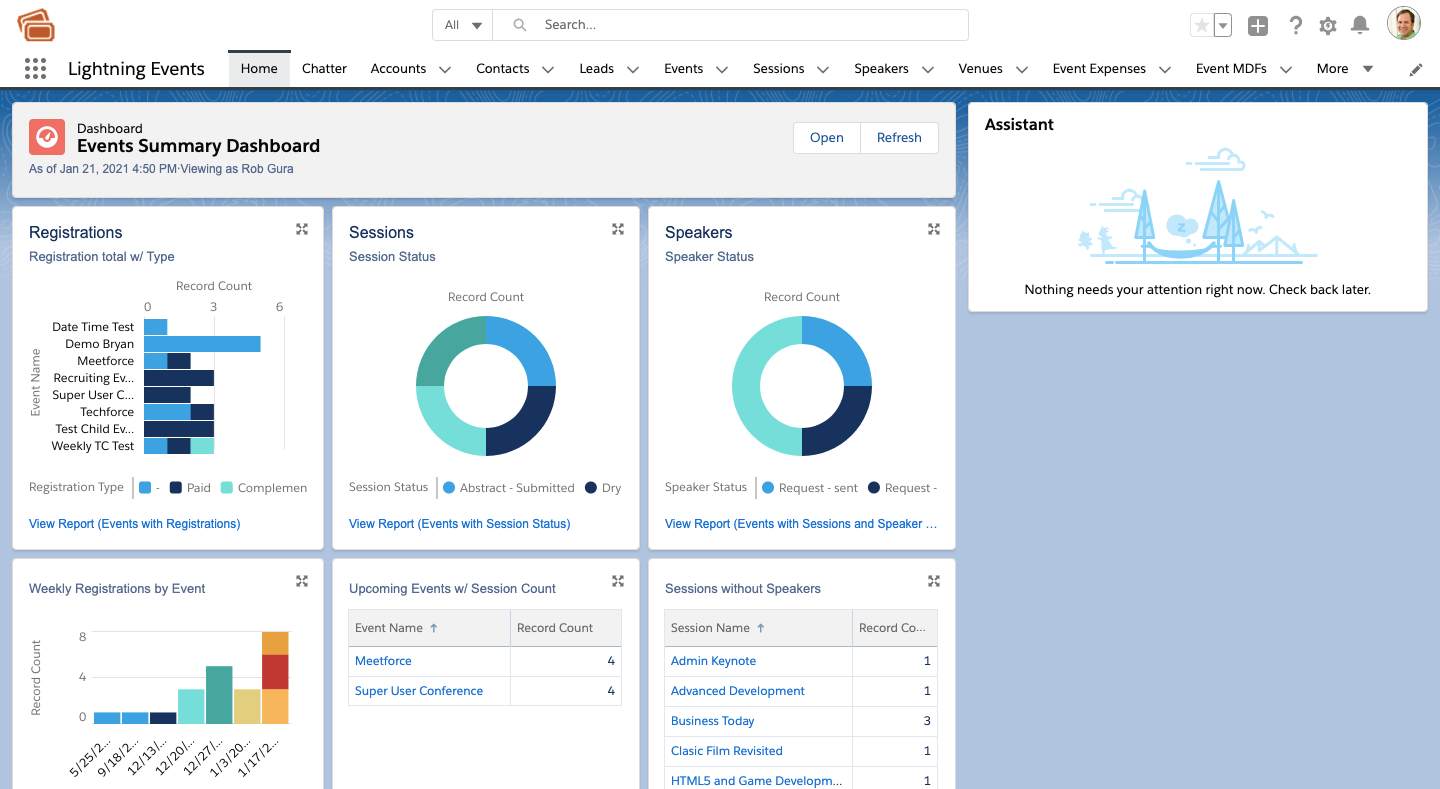
Events by Salesforce Labs is a free, open-source app developed by Salesforce Labs and available freely on AppExchange. To use this app, you need a Salesforce edition that supports custom apps and components, such as Professional, Enterprise, or Unlimited editions.
If you do and look for basic event management capabilities Events can be a good add-on to help your team optimize event planning and tracking. While the app itself is free, keep in mind its tech and biz limitations:
- Salesforce doesn’t officially support Labs apps.
- In case of any issues you’re on your own, so it’s vital that you know Salesforce infrastructure in and out.
- Branding, customization, payments and integrations are either limited or require third-party tools.
- If you run internal or basic free events, Events can be your way-to-go. For commercial or large-scale events, consider more complete event management app alternatives.
Also Read: Choosing Best Native CRM Scheduling App—SUMO Scheduler vs Salesforce Scheduler
#3. Blackthorn – Best For Event-Heavy Organizations
Best Fit For: enterprise teams with complex event marketing needs and active calendars.
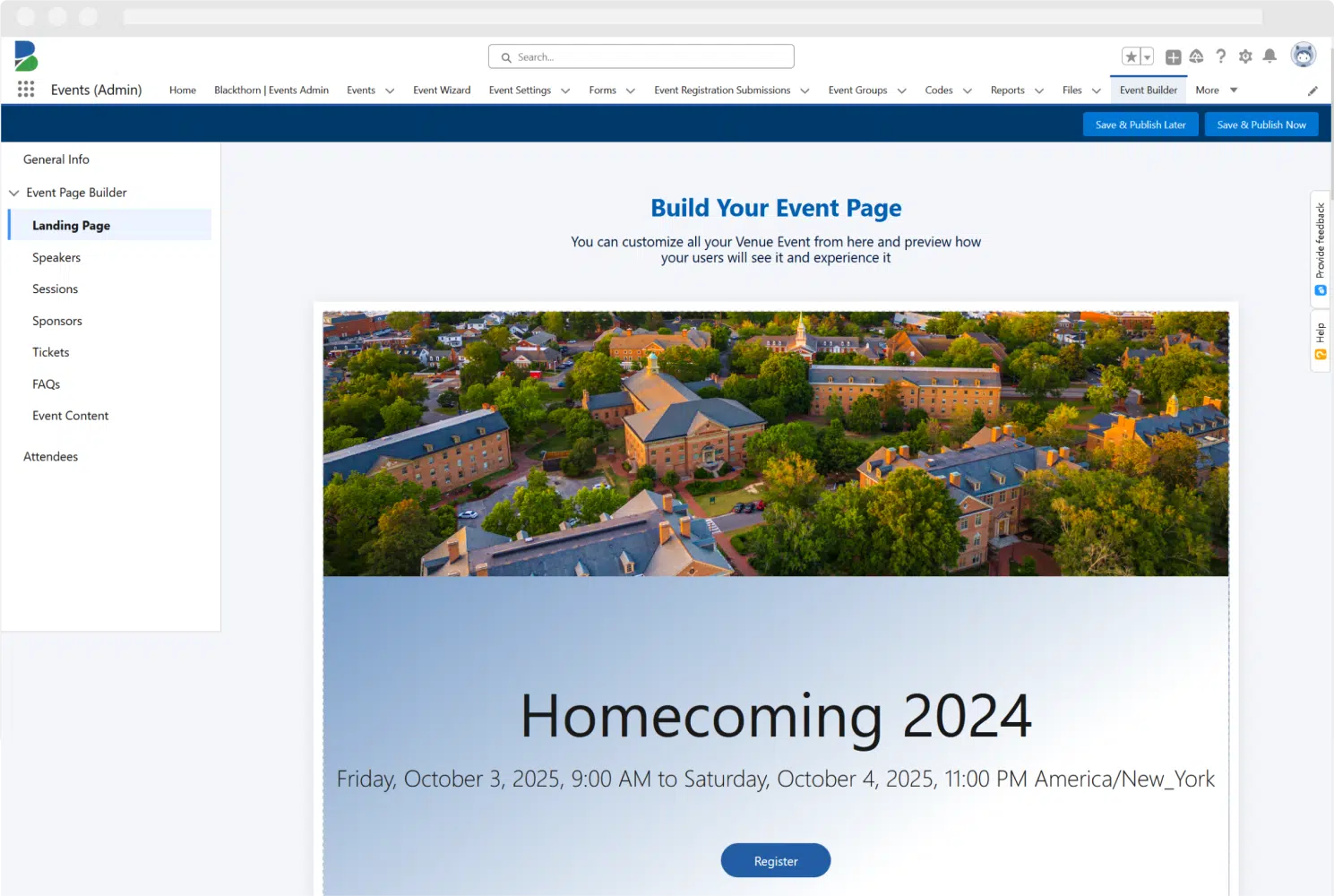
With an average 4.9 rating on AppExchange based on 255 reviews (the largest number of all), Blackthorn has rightfully earned its name as a leading event management platform with all the features you can think of. Event creation, registration management, payment processing, check-ins, and post-event analytics—you name it.
What users love most about Blackthorn is its ease of use, with an intuitive Event Wizard and prompt support ready to assist with any issue you may have when setting up your events. The only fly in the ointment is its cost and yearly subscription plan, which may be a consideration for smaller teams or organizations that are not heavy on events. It is commonly used by enterprise-grade companies that require detailed CRM reporting and event automation.
Pros:
- Fully native Salesforce application.
- User-friendly Event setup wizard
- Offers features like event creation, registration management, payment processing, and mobile check-ins.
- Regular updates and enhancements to the platform.
Cons:
- Some users complain about complex customization requiring technical expertise and lack of support.
- Highest price with rigid early subscription
#4. Fonteva Events Salesforce App
Best Fit For: associations, nonprofits, and enterprises
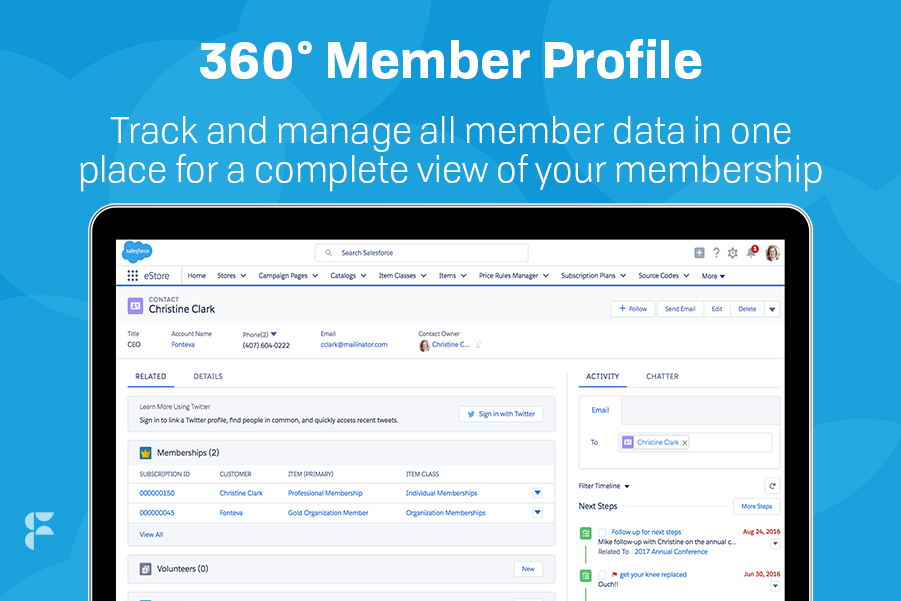
Fonteva Events is a native Salesforce event management app designed for associations, nonprofits, and enterprise customers. It allows users to manage all aspects of event planning from within Salesforce, including sessions, speakers, sponsors, registrations, payments, and venue logistics. Fonteva’s functionality supports both in-person and virtual events.
It is built on the Salesforce Lightning Platform, which allows users to customize their events experience with declarative tools. Fonteva is often part of a broader association management suite and includes features like member pricing tiers, engagement tracking, and real-time dashboards. It’s particularly suited for organizations running large-scale conferences and annual meetings.
Pros:
- Fully native to Salesforce.
- Supports in-person, virtual, and hybrid events with features like agenda builders and attendee management.
- Solid features: hybrid events, automation, analytics, and branded pages
- Great for multi-track events, registrations, and payments
Cons:
- Annual license fee, which may be a consideration for smaller organizations.
- Some users complain that features are incompatible together and customization may cause things to break.
#5. Cvent Salesforce App
Best Fit For: Enterprise-level organizations using Cvent for event management and seeking to integrate attendee data with Salesforce.
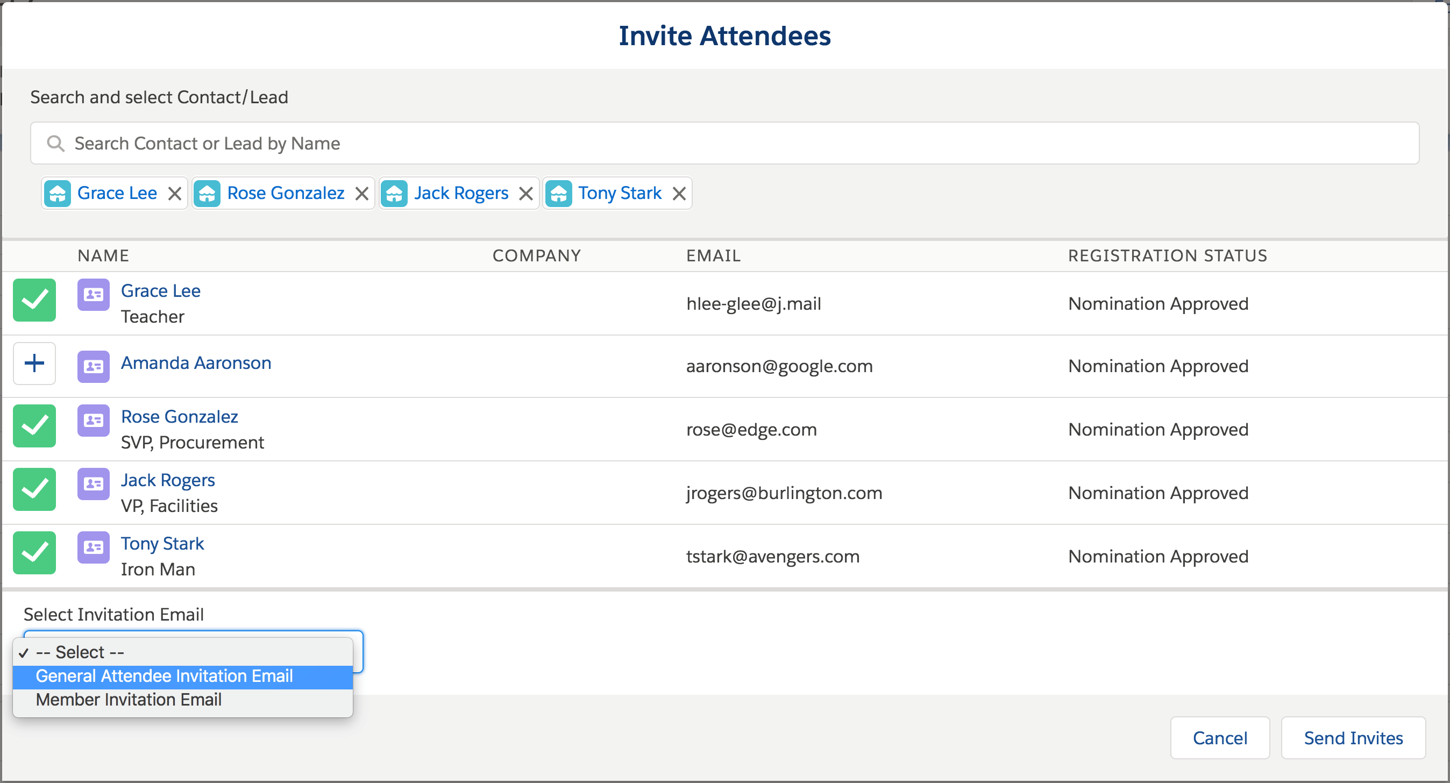
Cvent is a standalone event management platform with a connector to Salesforce CRM. It allows users to push data such as registrations, attendance status, and session participation from Cvent into Salesforce contacts, leads, and campaigns. The app is not fully native to Salesforce but provides a two-way data exchange between platforms.
Cvent is often used for enterprise-level event planning including conferences, webinars, and trade shows. The Salesforce integration helps with aligning marketing and sales follow-ups post-event but does not offer deep customization within Salesforce itself. It is suited for organizations that already use Cvent and want to centralize attendee insights within their CRM.
Pros:
- Allows syncing of attendee data and activities between Cvent and Salesforce.
- Supports new attendee activities like ad views and clicks for enhanced engagement tracking.
Cons:
- Not a fully native Salesforce application; functions as a connector.
- Customization within Salesforce is limited compared to native solutions.
- Some users complain about service quality, misleading and misinformed sales teams.
- not fit for nonprofits
#6. Eventbrite – Best For Small Teams & Quick Launch
Best Fit For: Organizations already using Eventbrite for event management and seeking to sync data with Salesforce.
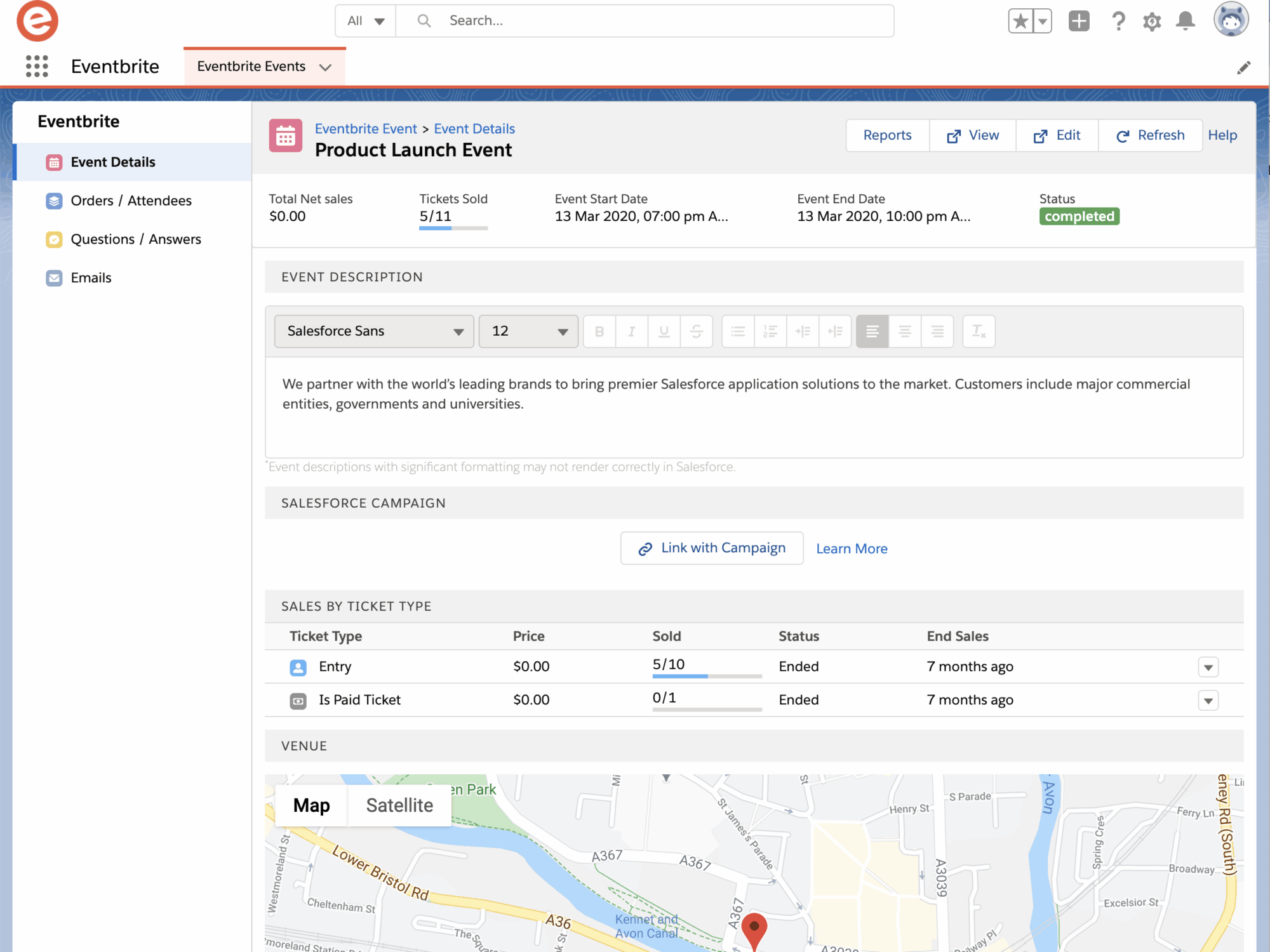
Eventbrite for Salesforce is an integration connector that allows users to sync attendee and event data from Eventbrite into Salesforce. It is not a native app but rather a middleware solution typically offered through third-party platforms like Zapier or integration services. This integration supports the transfer of registration information, contact updates, and ticketing history into Salesforce for further segmentation and engagement.
Since Eventbrite itself handles public-facing event promotion and ticket sales, it is often used for community events, webinars, and conferences. However, its Salesforce integration is typically limited in terms of automation or CRM-native capabilities compared to fully integrated Salesforce apps. Users commonly rely on additional customization or third-party tools for syncing and reporting.
Pros:
- Facilitates the transfer of registration and attendee data from Eventbrite to Salesforce.
Cons:
- Not a native Salesforce application; relies on integration.
- Limited in terms of automation and customization within Salesforce compared to native apps.
#7. RegFox + Salesforce Integration
Best for: Budget-conscious teams
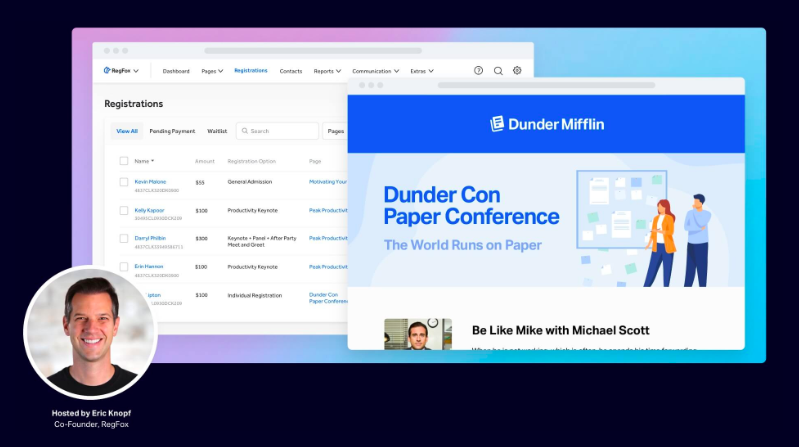
RegFox is not a native Salesforce app but can be integrated with Salesforce using third-party middleware tools like Zapier or custom API setups. It is known for its flexible registration form builder, conditional logic, and payment features. The integration enables data such as attendee details and ticket purchases to be passed into Salesforce for CRM and marketing purposes.
RegFox is popular among event organizers looking for a highly customizable frontend for event registration, but the Salesforce integration typically requires technical setup. It is often used by independent event organizers with specific branding and checkout needs.
Pros:
- Flexible registration form builder with conditional logic.
- Supports self-registration, payments, and forms, but limited automation
Cons:
- Not a native Salesforce application.
- Integration requires third-party tools or custom API setups.
Event Management Apps Use Cases
Healthcare: Patient appointment scheduling and follow-ups, Wellness webinars and workshops (e.g., diabetes management, mental health awareness), Continuing medical education (CME) events for practitioners, Community outreach programs, Vaccination drives.
Education: Student event scheduling, enrollment and admissions info sessions, open days, student orientation, alumni events, Online courses and webinar series, Parent-teacher meetings and faculty workshops.
Nonprofits: Nonprofit event scheduling, charity, fundraising, volunteer sign-ups, church events.
Government: Public information sessions, town hall meetings, government & DMV appointments, civil consultations, job fairs and training events, community engagement and safety workshops.
Sales and Marketing: Product demos, webinars, event-based outreach, thought leadership panels, roadshows, partner events, customer success workshops.
Technology / SaaS: Developer conferences, meetups, product roadmap webinars, hackathons, investor pitching & networking events.
Why to Integrate Event Management Apps in Salesforce
While the majority (60%) of executives bet on events as the #1 marketing channel, 19% of event marketers do not have the right data or 18% do not have the right tools to measure the success of their events. Event management software solves the puzzle equipping you with tools to craft more impactful, engaging, and profitable events. Here are the advantages of using them:
- Centralized data: Event management apps, especially those native to Salesforce, allow you to store all event-related information within your Salesforce database.
- Streamlined workflows: These apps automate various event management tasks, reducing manual effort and improving efficiency.
- Less stress, more focus. Event managers spend a great deal of time planning event campaigns. The stress doubles if you’re working on multiple events at the same time. Event management apps save time reducing manual tasks and help you focus on the human aspect of the event rather than operational one.
- Lower risk of errors, better collaboration. Organizing events requires attention to detail and often team work. A proper software ensures all the different tasks and information associated with planning an event is stored in Salesforce CRM and synced between the responsible members.
- Data-backed decisions, more efficient events. Event management apps often include detailed analytics, allowing you to track key metrics and measure the success of your events.
Summing up
When choosing an event booking app for Salesforce, it’s essential to weigh the trade-offs between native and third-party solutions by focusing on your specific pain points, desired simplicity, customization needs, and long-term value.
Non-technical event planners often struggle with fragmented tools and tech-related issues, making intuitive, scalable solutions especially valuable. Look for apps that support custom objects, offer role-based access, and can flexibly handle everything from small webinars to large conferences.
To boost engagement, features like automated reminders are key to reducing no-shows and managing last-minute attendance.
Explore how SUMO Scheduler can streamline your event planning process right inside Salesforce—designed for busy teams who need powerful scheduling without the hassle.

![Top 7 Salesforce Event Management Apps Compared [2025]](http://3.87.237.186/wp-content/uploads/2025/05/Hero-Image-Title_-Best-Event-Management-Apps-For-Salesforce-Compared.png)

